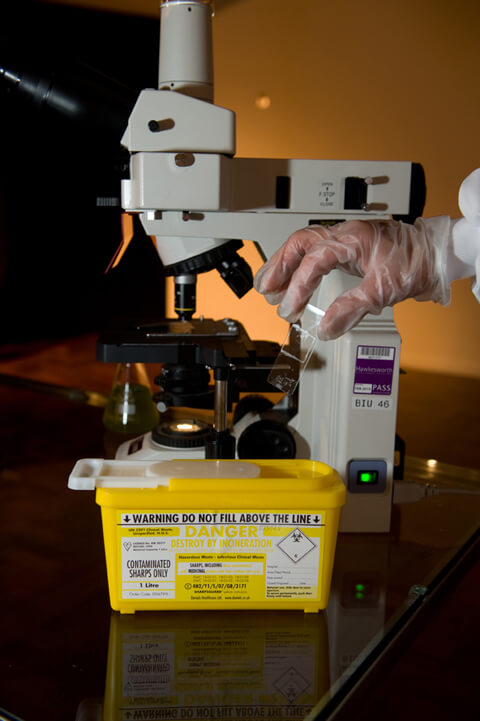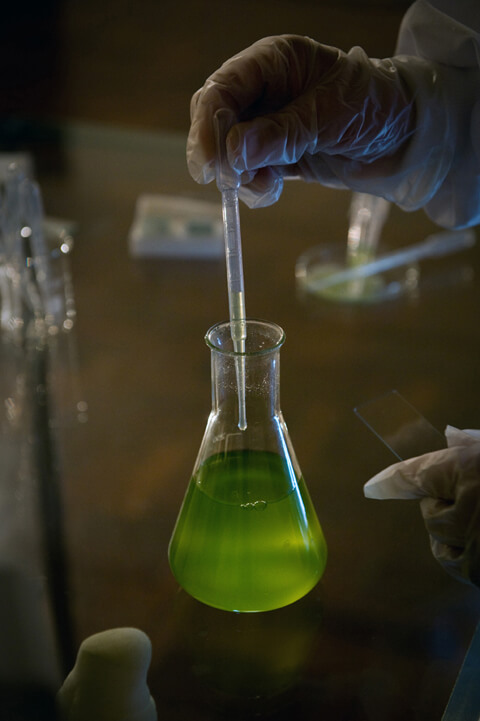Words by Meritxell Rosell
Louise Mackenzie, a contemporary artist based in the UK, addresses her work as a search for the human essence in the material and the physical form. Evolution, the genetic code and mutation are blended with social culture and post-humanism, in an attempt to explore the meaning of human existence with emotive and soul-touching works.
Louise, who studied psychology before enrolling as a fine artist, works very closely with scientists in most of her projects. For Viral Experiments, current ongoing research, she integrates concepts of synthetic biology, genetics and communication. Viral experiment #1 is a gif. animated sequence of words and ideas recalling mutability and propagation; Bacterial Sensing, inspired by Joe Davis’ Audio Microscope (2000) and a work in progress too, is an attempt to record sound alterations in bacteria under different “stresses”, delving into a closer understanding of mutability.
Oltramarino and Life Support, for which she uses cyanobacteria (blue archaic photosynthetic bacteria), are both a very evocative and oneiric approaches to shine light onto fundamental metaphysical questions: what is existence, what is out there and what is beyond us.
Seeking to understand the macro and afar (universe and soul) Louise’s work expands from the micro (bacteria, virus). A poetic reflection on the human mind and our most deep anxieties throughout our existence as a species. The glow of light into the dark, infinite unknown.

viralvirus
What is more important, to take or not to take yourself too seriously in order to be creative?
Both. I take my profession very seriously. I have worked hard to gain the privilege to be able to work creatively and I see it as my responsibility to produce high-quality work that speaks of the ideas and emotions that excite me.
On the other hand, to be creative at the moment, you can’t take yourself too seriously. You have to allow all kinds of ideas to flow freely and run with some that might seem absurd, risky or flawed. You can’t make fully resolved work without doing that.
What is your chief enemy of creativity?
Pragmatism combined with a hypocritical stance against consumer culture. I have no problem filling a sketchbook, but I find it hard to justify realising my ideas when ultimately that contributes to an excess of objects in the world. I’m a complete hypocrite and fail all the time, of course.
What’s your favourite time of the day?
That point just before dusk, when the sun is low in the sky and buildings in the city are bathed in this magical warm light. It’s a light unlike any other and for some reason it never fails to trigger strong emotions in me.
Midnight also. Some of my favourite ideas come to me just before I fall asleep.
Do you consider yourself an introvert or extrovert?
I don’t believe in labels, but there might be sliding scales (or perhaps expanding spheres). I’m pretty sociable and I might appear more extrovert, but I love my quiet time and could spend significant chunks of my life in solitude quite happily.
What is the worst piece of advice you have been given?
That earning a living and making art are mutually exclusive. That depends on what your priorities for living are.
Who or what was the last person, place or thing that fascinated you?
I recently met Professor Colin Cunningham, UK Programme Director for the European Extremely Large Telescope. It’s an immense project that will take decades to complete, billions to fund and it might just enable us to find an exoplanet with Earth-like properties.
It fascinates me that as a species we are not content to exist but instead invest so much time and energy pushing beyond our capabilities, searching for new knowledge that in some cases we won’t even realise within our own lifetime. I also have to give a shout-out to Joe Davis. I love the way his mind works, a true polymath. I see him as a modern-day Robert Hooke.








